
A magnificent game of a novel, one in which the brilliant postmodern contrivances actually add to the poignancy of its anguished Victorian characters. Charles Smithson is an amateur paleontologist living on the southwestern coast of England. Ernestina is his drearily upright fiancee. Sarah Woodruff is an enigmatic local governess, said to be pining for a French soldier who has misused her. The fourth major figure in this book is not a character but the author. By no means all-powerful, he discovers early on that he has lost control of his characters and proposes in that case to let them have their freedom. And he means it. The story procedes through alternative episodes — in one Charles marries Ernestina; in another he doesn’t — and multiple endings, with the author sometimes turning up to walk among his characters and comment tartly on their actions. In its final pages — don’t dare to call them a conclusion; in a book so open-ended, what could that word mean? — he opens a vista onto freedom that’s both dazzling and devastating.
